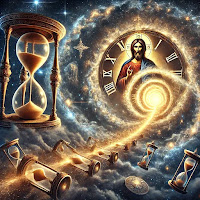The connection between time and eternity is both fascinating and meaningful. Imagine time as a river, always flowing forward, while eternity is like a vast ocean surrounding it, stretching endlessly in every direction. Another helpful analogy is reading a book: time is like reading one page at a time, while eternity is like holding the entire book in your hands, seeing all pages simultaneously.
Philosopher Nicolas Berdyaev beautifully expresses this concept, saying, "Eternity is not the opposite of time but the depth of time.” C.S. Lewis adds, “The present is the point at which time touches eternity." Saint Augustine describes eternity not simply as endless time but as an eternal "now."
God exists beyond time, in an eternal present. When we fully embrace the present moment—letting go of worries about the past or anxieties about the future—we connect deeply with eternity and experience God’s presence.
In Orthodox Christian tradition, understanding this relationship between time and eternity helps explain the Kingdom of God. Often, we imagine the Kingdom as a distant reality we reach after death, but Jesus teaches us, "The kingdom of God is within you" (Luke 17:21). This means the Kingdom isn’t just something we wait for—it’s something we can experience right now.
Metropolitan Anthony Bloom explains, "Heaven is the presence of God, the place where He dwells in full glory. It is not merely another world; it is the reality behind all worlds."
Elder Aimilianos of Simonopetra reminds us, "Paradise is not merely a future promise; it begins in the soul that lives in Christ even now, tasting already the sweetness of eternity."
Saint Isaac the Syrian encourages us: "Enter eagerly into the treasure house that lies within you, and you will see things of heaven—for there is but one single entry to them both. The ladder that leads to the Kingdom is hidden within you, within your own soul."
Metropolitan Anthony Bloom emphasizes, "If you cannot find Paradise here and now, you will not find it anywhere else. For Paradise is not geography—it is the state of a soul completely surrendered to God, fully awake to His presence."
Saint Gregory of Nyssa clearly states: "The Kingdom of God is not a place, but a state of soul." Paradise isn’t merely a future reward; it’s being close to God here and now, experiencing harmony, peace, and joy through His presence.
This understanding changes how we think about eternity. Eternity is not just endless time or something beyond understanding. Instead, it is the fullness of life we experience when we are completely present with God. We encounter moments of eternity when we pray, worship, or genuinely connect with God and others through love. This is at the heart of Orthodox prayer, worship, and the sacramental life—embracing the spiritual reality that is always with us, integrated into our daily lives and the whole of creation.
Many people view "apocalyptic" writings (such as the book of Revelation) as frightening predictions about the end of the world. However, their true purpose isn’t to scare us but to inspire us to live differently right now. The word "apocalypse" means "unveiling" or "revealing," inviting us to recognize what truly matters—living lives of kindness, justice, peace, and love.
Instead of anxiously awaiting future events, we are called to live actively and consciously in God's presence today. Our choices matter, and we each have the power to shape a world filled with greater love, peace, and justice. The Apostle Paul urges us, "Awake, O sleeper, and arise from the dead, and Christ will shine on you" (Ephesians 5:14).
Ultimately, eternity isn’t just a distant idea; the Kingdom of God is a reality available to us every day. By creatively engaging with the world, remaining mindful of God's presence, and participating actively in the sacramental life and disciplines of the Church, we align our lives with the timeless beauty, truth, and love of His eternal Kingdom. Through this meaningful participation, we reflect the Kingdom here and now.

No comments:
Post a Comment
Note: Only a member of this blog may post a comment.